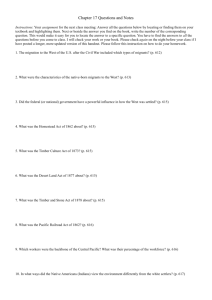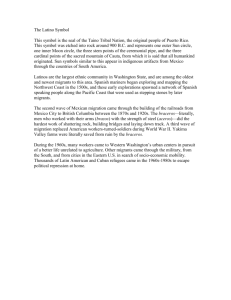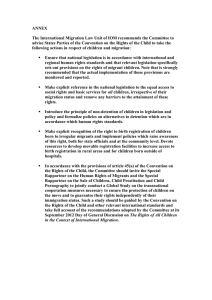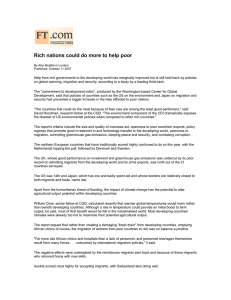A General Assembly United Nations Human Rights Council
advertisement
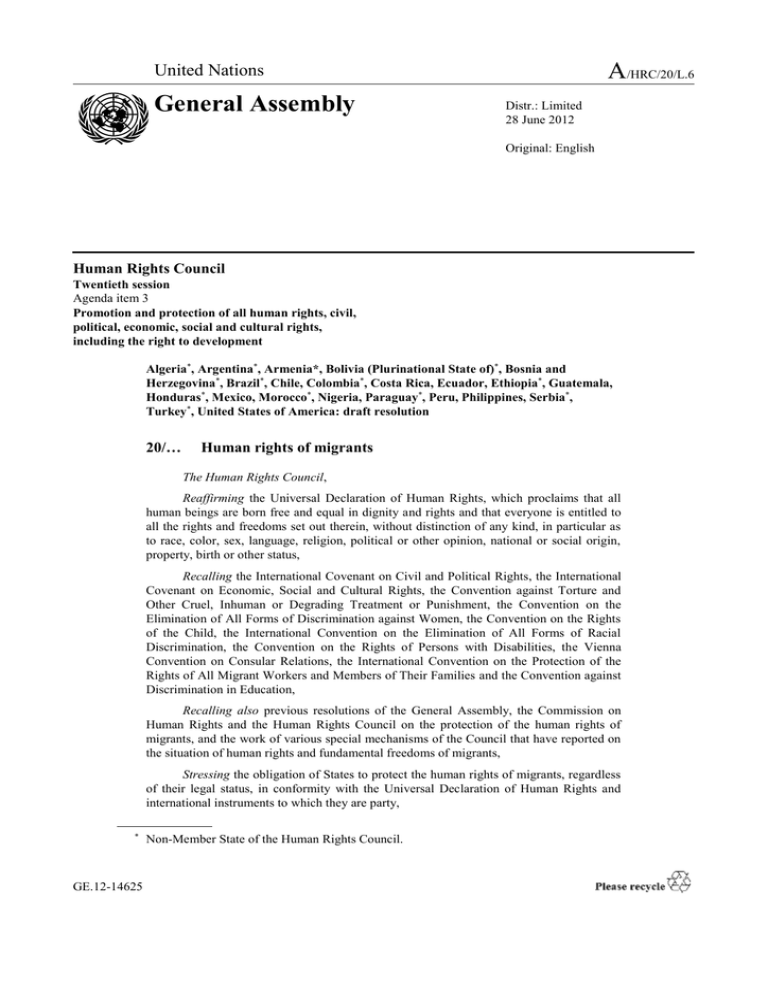
A/HRC/20/L.6 United Nations General Assembly Distr.: Limited 28 June 2012 Original: English Human Rights Council Twentieth session Agenda item 3 Promotion and protection of all human rights, civil, political, economic, social and cultural rights, including the right to development Algeria*, Argentina*, Armenia*, Bolivia (Plurinational State of)*, Bosnia and Herzegovina*, Brazil*, Chile, Colombia*, Costa Rica, Ecuador, Ethiopia*, Guatemala, Honduras*, Mexico, Morocco*, Nigeria, Paraguay*, Peru, Philippines, Serbia*, Turkey*, United States of America: draft resolution 20/… Human rights of migrants The Human Rights Council, Reaffirming the Universal Declaration of Human Rights, which proclaims that all human beings are born free and equal in dignity and rights and that everyone is entitled to all the rights and freedoms set out therein, without distinction of any kind, in particular as to race, color, sex, language, religion, political or other opinion, national or social origin, property, birth or other status, Recalling the International Covenant on Civil and Political Rights, the International Covenant on Economic, Social and Cultural Rights, the Convention against Torture and Other Cruel, Inhuman or Degrading Treatment or Punishment, the Convention on the Elimination of All Forms of Discrimination against Women, the Convention on the Rights of the Child, the International Convention on the Elimination of All Forms of Racial Discrimination, the Convention on the Rights of Persons with Disabilities, the Vienna Convention on Consular Relations, the International Convention on the Protection of the Rights of All Migrant Workers and Members of Their Families and the Convention against Discrimination in Education, Recalling also previous resolutions of the General Assembly, the Commission on Human Rights and the Human Rights Council on the protection of the human rights of migrants, and the work of various special mechanisms of the Council that have reported on the situation of human rights and fundamental freedoms of migrants, Stressing the obligation of States to protect the human rights of migrants, regardless of their legal status, in conformity with the Universal Declaration of Human Rights and international instruments to which they are party, * GE.12-14625 Non-Member State of the Human Rights Council. A/HRC/20/L.6 Reaffirming the human right of everyone to education, which is enshrined in, inter alia, the Universal Declaration of Human Rights, the International Covenant on Economic, Social and Cultural Rights, the Convention on the Rights of the Child, the Convention on the Elimination of All Forms of Discrimination against Women and the Convention on the Rights of Persons with Disabilities, and other relevant international instruments, Reaffirming also the need for adequate financial resources so that everyone can realize his or her right to education and the importance in this regard of national resource mobilization and international cooperation, Recalling the Global Forum on Migration and Development process, including the debates on migratory mobility, which emphasize the importance of facilitating access to regular forms of migration and, where applicable, to social services, including education, that contribute to the strengthening of the personal development prospects and outcomes for migrants and their families, Concerned about the large and growing number of migrants, especially women and children, who place themselves in a vulnerable situation by attempting to cross international borders without the required travel documents, and recognizing the obligation of States to respect the human rights of those migrants, Considering that, in accordance with their international human rights obligations, States are responsible for promoting and protecting human rights, including the right to education, without discrimination, Noting the observation of the Special Rapporteur on the right to education that States’ obligations to ensure the provision of adequate resources to overcome constraints to the realization of the right to education consistently figure in the concluding observations adopted by the United Nations human rights treaty bodies, 1 Considering the need for all relevant stakeholders to achieve the goals of the Education for All initiative as well as Millennium Development Goal 2, as contained in the outcome document of the High-level Plenary Meeting of the sixty-fifth session of the General Assembly, by, inter alia, tackling persistent economic and social inequalities, including on the basis of such factors as income, gender, location, ethnicity, language and disability, and noting the role that good governance can play in that regard, Emphasizing the global character of the migratory phenomenon, the importance of international, regional and bilateral cooperation and the need to protect the human rights of migrants, particularly at a time when migration flows have increased in the globalized economy and take place in a context of new security concerns, Mindful of the fact that, in the fulfilment of their obligations to protect human rights, States of origin, transit and destination can benefit from schemes of international cooperation, Mindful also that migrant access to education may help to mitigate the risk of widening inequalities in education, 1. Reaffirms the duty of States to effectively promote and protect the human rights and fundamental freedoms of all migrants, especially those of women and children, regardless of their immigration status, in conformity with the Universal Declaration of Human Rights and the international instruments to which they are party; 2. 1 2 Stresses that education contributes to the full enjoyment of human rights; A/66/269, para. 8. A/HRC/20/L.6 3. Calls upon States to recognize and respect the right of everyone to education, as enshrined in the Universal Declaration of Human Rights, and encourages them to take steps that promote the prevention and elimination of discriminatory policies that deny migrant children and children of migrants access to education; 4. Expresses concern at legislation and measures adopted by some States that may restrict the human rights and fundamental freedoms of migrants, including the enjoyment of the right to education; 5. Reaffirms that, when exercising their sovereign right to enact and implement migration and border security measures, States have the duty to comply with their obligations under international law, including international human rights law, in order to ensure full respect for the human rights of migrants; 6. Also reaffirms the fact that all migrants are entitled to equal protection by the law and that all persons, regardless of their migratory status, are equal before the courts and tribunals and, in the determination of their rights and obligations in a suit at law, are entitled to a fair and public hearing by a competent, independent and impartial tribunal established by law; 7. Calls upon all States to ensure that their immigration policies are consistent with their obligations under international human rights law; 8. Urges States to take specific measures to promote access to education for everyone, including by taking into account physical, financial, cultural and linguistic barriers that may contribute to furthering inequalities; 9. Encourages countries of origin, transit and destination to seek technical assistance and/or to collaborate with the Office of the United Nations High Commissioner for Human Rights to better promote and protect the human rights of migrants, including the right to education; 10. Requests the Special Rapporteur on the human rights of migrants and the Special Rapporteur on the right to education, within their respective mandates, to continue their efforts to promote and support the building of greater synergies among States to strengthen cooperation and assistance for the protection of the human rights of all migrants and to promote their right to education; 11. Also requests the Special Rapporteur on the human rights of migrants to continue to report on practical solutions, including by identifying best practices and concrete areas and means for international cooperation, in order to enhance the protection of human rights of migrants. 3
